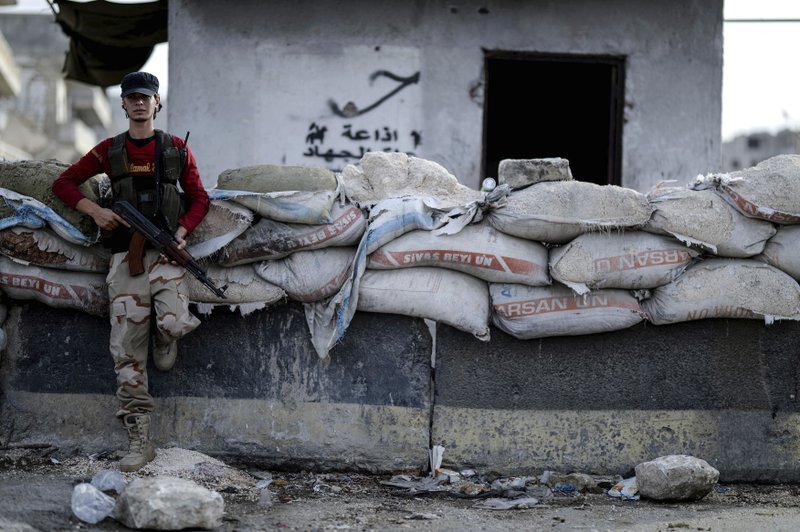BEIRUT -- While the final battle to retake the Islamic State's last pocket of territory rages in eastern Syria, violence is escalating in the country's northwest, pitting al-Qaida-linked militants against Syrian government forces.
The violence in the Idlib region threatens to unravel a truce reached between Turkey and Russia last year that averted a bloody assault by the government to retake the province, the last major rebel stronghold in war-torn Syria. The escalation raises fears once more of a major assault by the forces of President Bashar Assad.
Idlib has been in the hands of opposition forces for years, even as Assad's military has succeeded in retaking other rebel enclaves one after the other. The province is now home to some 3 million people, many of them displaced from other former opposition territory. Earlier this year, al-Qaida-linked militants took over the province, squeezing out most other factions after clashes with Turkey-backed opposition fighters.
Since then, government forces have intensified airstrikes and bombardment of Idlib towns. Since mid-February, some 100,000 people have been displaced, largely by government bombardment, and have fled to villages deeper in rebel-held territory, according to the Britain-based Syrian Observatory for Human Rights. The group said that around 140 people, including 69 civilians, have been killed.
The mounting violence points to how Syria's nearly 8-year-long civil war still has the capability to burst once more into major bloodshed. The focus of the U.S. and other countries has been on defeating the Islamic State, which once held eastern and northern Syria, and Assad's conflict with his opponents has quieted in recent months after government victories and the truce. But the root of that conflict remains.
The militants, from an al-Qaida-linked group called the Levant Liberation Committee, have also stepped up their attacks -- in retaliation, they say, for the government bombardment.
Earlier this month, militants attacked several Syrian army positions and checkpoints on the edge of Idlib in the village of Masasneh, killing nearly two dozen soldiers -- one of the most serious attacks on government forces since the truce reached in September. The attack triggered hours of fighting and bombardment that killed and wounded dozens of insurgents.
The Syrian Foreign Ministry warned afterward that the military was in "full readiness" to deal with repeated violations of the truce.
Russia, which backs Assad, and Turkey, which supports opposition factions, put together the truce in September. They agreed to establish a 9-12 miles-wide demilitarized zone in Idlib in which they said militants will not have a presence. The deal also offered the Syrian government and Russia one of their main demands -- opening two key highways that pass through Idlib and link northern Syria with Damascus and other cities. But neither provision was implemented despite a deadline for opening the roads by the end of 2018.
Still, the truce has been vital to keeping a degree of calm and preventing an all-out battle for Idlib.
The U.S. deputy ambassador at the United Nations, Jonathan Cohen, last month expressed American concern over the increase in government airstrikes and other violence in Idlib.
"Terrorism cannot be used as a pretext for targeting civilians," he said in a reference to the al-Qaida-linked group's control of the area. "Any major military operation in Idlib would be a reckless escalation of the conflict and would result in a humanitarian catastrophe far beyond what we've witnessed."
A Levant Liberation Committee military commander known as Abu Khaled al-Shami released a video statement expressing pride for killing government soldiers and vowing more attacks.
"Hayat Tahrir al-Sham will retaliate forcefully if regime forces try to advance toward liberated areas," he said.
The leaders of Russia and Turkey held another summit in mid-February after which both leaders said there will be no offensive by Syrian government forces on Idlib and promised to work together to prevent the province from becoming a "stronghold of terrorists."
On Friday, Turkey's defense minister said Turkey and Russia will begin patrols in the demilitarized zone in Idlib -- though violence continued over the weekend despite some patrols.
A Section on 03/13/2019
